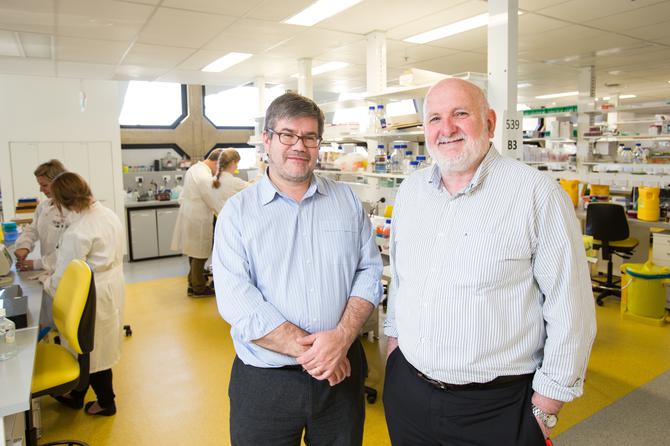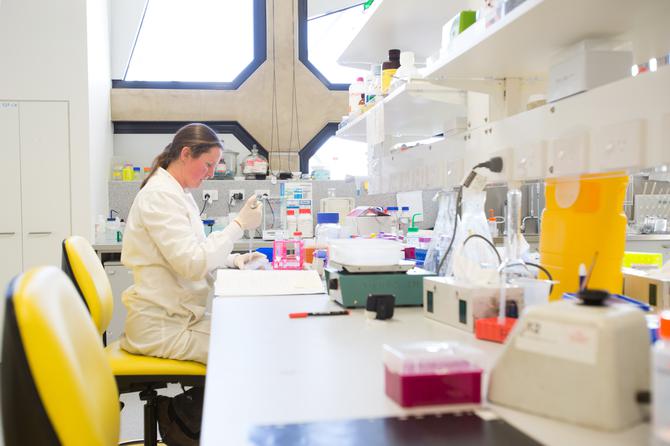Did you know people with low educational attainment have a higher risk of developing dementia?
What can help? Crossfit for your brain.
The Wicking Dementia Research and Education Centre has a new MOOC, Preventing Dementia, which will help exercise your mind while teaching you about the importance of doing so.
The Centre’s first MOOC, Understand Dementia, was massively successful, and Preventing Dementia already has strong interest.
Professor James Vickers (Professor of Pathology), is a Co-Director of the Wicking Centre. He has been working in the field of neuroscience for more than 20 years.
“In the Wicking Centre we focus on three core areas of research; care, cause and prevention.
“Our NHMRC-supported Healthy Brain Project has been running since 2011 and will continue until 2020. It’s about getting older adults into University to see if it has a positive effect on their cognitive health, as that might help prevent or delay the onset of dementia."
Preventing Dementia MOOC
“Part of the reasons we came up with our new MOOC on Preventing Dementia is because there are seven key factors that science has settled on as being the major risk factors. One of those is low educational attainment."
People who don’t get many years of education seem to be at a higher risk of developing dementia. Conversely, if you’ve got more years of education in the early part of your life, then you’ve got a lower risk.
“When I started in neuroscience research people didn’t think there was much plasticity in the brain once you became an adult. But we know now there’s quite a lot of plasticity that’s retained in adults and older people. The Healthy Brain Project taps into that."
If you give your brain exercise to do, it has to be fairly intensive. We think it’s a little bit like crossfit, it’s probably not just one kind of brain exercise that is effective, you have to do multiple exercises.

"It probably has to be at the level that you can feel yourself working hard to produce those results. That’s why we think University study might be beneficial.”
“We also think MOOCs- if they stretch you, learning to learn online, navigating the material, interacting with people, learning new things- may well be beneficial, but we don’t know how many MOOCs you’d need to do; that could well be an area for further study into the future.
You want an intervention that is accessible and MOOCs as an educational phenomenon are pretty accessible.
A brainy topic
Professor Vickers said as a student he knew he was interested in the brain, but wasn’t sure what to study.
“I enrolled in Psychology here at the University of Tasmania and I was very lucky because in the Psychology department there were a couple of individuals who were getting into the neurosciences, and were very interested in the function and physiology of the brain.
“Through them our third year had the opportunity to do neuroanatomoy, which was in the School of Medicine, as part of our program. It really went from there.
I think if I hadn’t had that opportunity, I would have ended up being a psychologist and that would have been great, but having really good academic mentors at a crucial time sent me off in the direction of neuroscience.
“We’re in a golden era of brain research and we now know a tremendous amount, but there is so much yet to be discovered.
I’m still amazed on an almost weekly basis by the research that comes out in the areas that I work in. But there’s also many fundamental things that we don’t understand either. It keeps your interest up.

Understanding the “story” of dementia
Professor Vickers said dementia has “two levels” to it.
“There are definitely diseases that cause dementia, that have what we would call an organic cause of pathological changes inside the brain. The interesting thing though is two people can have the same amount of pathology in their brain, and one person might have a lot of impairment, and the other not so much.
“We think this aspect of plasticity or neural resilience might vary between people; your ability to basically deal with the pathology as it occurs in the brain.
“Another part of the research we do here in the Healthy Brain Project, as well as in our laboratory studies, is trying to understand the basis of the neural resilience.
“On the one hand it might be genetics, or it might be experience; all of those things that happen during life. They might also help build this neural resilience so you can resist this organic part of the disease process for a longer period of time.
“We understand a lot of parts of the story, like the sequence of brain changes and how genes may have an effect, but we don’t understand how the whole thing is working holistically.
“If we actually understood the underlying mechanism, then we probably have a good way of interfering with the process with a drug. But we still lack a full understanding.”
Professor Vickers said he is unsure a truly effective drug for Alzheimer’s disease will be developed in his lifetime.
That’s where prevention becomes even more critical. We can’t prevent all cases, in most cases it is due to ageing and genetics, but we think that somewhere between 30-50 per cent of cases can be prevented at a population level if we attended to these major risk factors.
“We know what these major risk factors are, so if we can convince the population to start doing something about them, then we may actually effectively prevent people from getting dementia, which is probably as good as trying to develop a new drug to prevent or slow the disease."
Interested in conducting your own research? Apply now to become a research student.